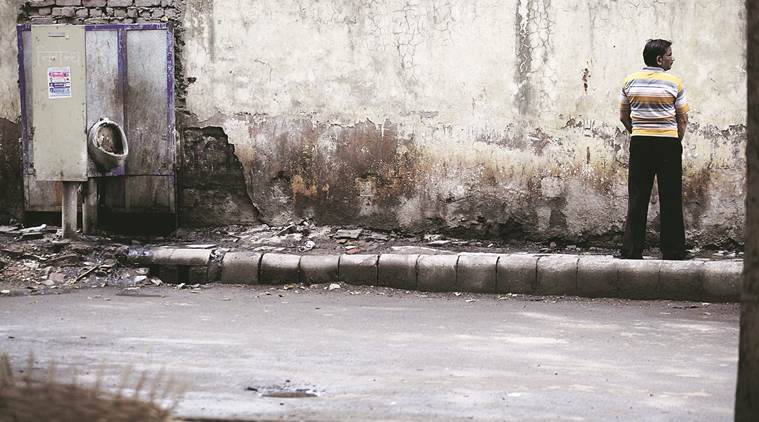In restaurant restrooms order, issues of SDMC’s own responsibility
Restaurant managements have been given the discretion to charge up to Rs 5 per use of their toilets. SDMC claims that as a result of the initiative, effective April 1, an additional 3,500 toilets will be accessible to the public.
 On paper, SDMC has 600 urinals and roughly 400 toilet complexes in its area. (Express/Tashi Tobgyal)
On paper, SDMC has 600 urinals and roughly 400 toilet complexes in its area. (Express/Tashi Tobgyal)
South Delhi Municipal Corporation last week made it mandatory for all hotels and restaurants in its jurisdiction to give “full access to the general public to [their] toilet facilities”. The suggestion came from Delhi Lieutenant Governor Anil Baijal who urged SDMC to explore the possibility. Restaurant managements have been given the discretion to charge up to Rs 5 per use of their toilets. SDMC claims that as a result of the initiative, effective April 1, an additional 3,500 toilets will be accessible to the public.
The move is part of a soon-to-be national campaign to make more toilet facilities available to the public, with special focus on women and children. The broad ideas are hygiene and security.
“By roping in hotels and restaurants along with petrol pumps (which too are privately owned and offer restroom facilities), we want to make as many toilets available to the public as possible,” says a top civic official. The decision has produced mixed reactions from restaurant owners. Some have complained of an undermining of their “rights of admission”; others have pointed out that it is insensitive to deny access to an individual who needs to use the restroom. Both sides agree that the proposed Rs 5 charge — to ostensibly cover costs of maintenance and cleaning — may be difficult or awkward to levy, and would probably not make a big difference to their revenues in any case. Like a glass of water, they would probably offer the use of their restrooms for free, they say — as they have already been doing in many cases. But some questions still arise.
The corporation, so far only the South, has passed the order by invoking its right to issue health trade licences to restaurant owners, and collect taxes for commercial activity. So could the same logic be extended to private homes and individuals, given the fact that it is the corporations that clear buildings plans and issue structural safety sanctions that affect 95% of Delhi’s population?
There is no such possibility, officials state. The order regarding hotels and restaurants must be seen in a “positive light”, they add. While the dire need for public restrooms in Delhi is beyond question, it is pertinent to consider, in the light of the SDMC order, the state of its existing public utilities. While on paper, the SDMC has 600 urinals and roughly 400 toilet complexes in its jurisdiction, most of them are unusable, and the opposition Congress has constantly attacked the ruling BJP over the state they are in.
The ambitious “waterless urinals” project initiated during the 2010 Commonwealth Games, failed and little has been done to revamp them over the years. In a speech last year, Leader of Opposition Farhad Suri said, “For years we have been told that waterless urinals will be converted into conventional urinals but very little progress has been made. Licence fee due from the waterless urinal concessionaire is not being collected.” Many of these urinals did not even have Jal Board connections.
A study commissioned by the Centre in 2015 to gauge the progress of Swachh Bharat programmes put Delhi at the 16th position, and some parts of the city at as low as 398th. The mayor had rubbished the ranking, citing the “unfair” criteria of measurement, but has since done little to improve the situation.
Maintenance of the SDMC’s public facilities is poor because the corporation does not have jetting machines that spray water at high pressure to clean the toilets — even though the purchase of jetting machines is a point made in every budget. A plan to start 100 toilets at places with high footfall many years ago is yet to take off. An additional 300 safai karamcharis were supposed to have been hired specifically for the maintenance of toilets. This is yet to happen. Sanitation — along with health and education — has been a sector in which SDMC has cut spending by 25% on average.
The corporation maintains that because restaurants get health trade licences from the corporation, they are bound to follow its orders. Officials argue that policy decisions made by the corporation have the same sanctity as those made by the Assembly, and are binding on all those who seek clearances from it.
The SDMC recently announced that wrestlers Geeta and Babita Phogat would be its Swachh Bharat ambassadors. The SDMC Commissioner expressed hope that the sisters would take the corporation’s message of cleanliness to the public, and “highlight the achievements of the SDMC in terms of activities undertaken under the Swachh Bharat Abhiyaan.”



- 011 day ago
- 021 day ago
- 031 day ago
- 041 day ago
- 051 day ago



































